Closing the Gender Gap on Abortion
We might not be able to get rid of sexism, but we can reframe “women’s issues” so men see them as their issues, too.
This is the week 10 edition of BordoLines’ “Election Watch.” I hope you’ll consider subscribing—and sharing—and “liking”!!
In a recent television appearance, Michigan Governor Gretchen Whitmer highlighted an all-too-often unrecognized reality: reproductive rights are an economic issue – and not only for women. “The most important, profound decision a person will make, especially a woman, or family, is whether and when to bear a child,” she noted. “So, this is about our personal economy. This is about our collective economy. How can women get into the workforce if they cannot make their own decisions about whether or when to bear a child or access health care?”
Whitmer is absolutely right. Too often, the press and voters treat abortion, and reproductive rights more broadly, as well as other “family” issues – like child tax credits, paid family leave policies and affordable childcare – as somehow different from economic issues. But they are not. All of these issues have significant long-term economic consequences for women, for their families, and for the economy.
(Laura Tyson, “Abortion and Reproductive Rights are Economic Issues,” in Project Syndicate, September 20, 2024)1
I’ve been hammering on this point for a long time:
Among feminists, for years I was fairly alone in pushing reproductive freedom as a social and economic equality issue—the dominant feminist arguments generally stopped short after the word “choice.” So I was delighted when Stacey Abrams, in her 2022 run for governor, declared that reproductive rights “is an economic issue.” Responding on Morning Joe to Mike Barnacle, who conceded that abortion is “an issue,” but “nowhere reaches” the importance as the price of food, gas, or housing, she insisted that caring for children is why we worry about food, gas, and housing. And since women are the ones who bear children, for women, “this is not a reductive issue. You can’t divorce being forced to carry an unwanted pregnancy from the economic realities of having a child.”
Unfortunately, the message didn’t get through. Among other explanations for Abrams’ loss is that her “platform tended to highlight issues of concern to women voters.” Whether true or not, it was the perception among men, including Black men. that she was focused on “women’s issues” like abortion. Not on “the economy.”
Unplanned pregnancy, it’s true, has the most proximate economic consequences for women, who may be forced to quit jobs, halt progress toward higher education, or eschew jobs that offer greater possibilities for promotion and higher pay but require “grueling, unpredictable schedules” But every limitation on a woman’s ability to bring income into the family also places a greater economic burden on husbands and partners. The burden may be mitigated if one can afford child care or has it provided at work, but it rarely is. So it’s no surprise, as Tyson outlines in blistering detail, that “there are strong links between poverty and abortion – denying access to abortion places the greatest economic burden and significant health risks on low-income, often minority women, increasing both poverty and inequality.”
Alito and the others who decided Dobbs were well aware of studies that showed the economic consequences of their decision. They simply chose to ignore them, pretending to be “pro-family” while in reality they were only “pro-fetus.” The same has been true of the elected leaders who have introduced and promoted the cruelest, most draconian abortion bans: “They wrap themselves in pro-family rhetoric. But the reality is starkly different. In the states with the strictest abortion restrictions, children are more likely to be poor, and babies are more likely to die in their first month. Additionally, women in these states experience higher maternal mortality rates and are less likely to complete their education”.
All of this means reproductive “issues” are issues for men as well as women—and not just because of their emotional ties with women and girls, which have tended to be emphasized in men’s “pro-choice” movements, but because insofar as the economic well-being of families is not dependent on their earnings alone, what happens to their female wives and partners matters to their economic well-being too.
I wish more men saw it this way. If they did, we might not have the huge gender gap that has been widening (with a few ups and downs) since 1980 and that currently is, as Steve Kornacki put it, “off the charts,” with Harris leading among women by 21 points and Trump leading among men by 12. That’s a 33-point gender gap, the biggest in electoral history. And while the enthusiasm of women for Harris—which may, for the first time, cut across party affiliations and bring white Republican women into the Democratic camp—is enhancing her chances of a huge popular victory, the male pro-Trump factor may be a problem in clinching an electoral victory—the one that counts, unfortunately—for her.
The men that prefer Trump do so for a variety of reasons, including garden-variety sexism, and the fact that “Republicans have stolen the reputational space of strength and masculinity while Democrats own the existence as the party that is more sympathetic to those who need help and their nurturers.” Racial factors enter in, too; In describing where the Democrats consistently “overlooked” Black men’s issues, Phil Agnew, director of “Black Men Build,” points to the Democrats failure to address the disproportionate incarceration of Black men, the lack of “working-class” jobs, and the special importance that Black men, vilified by stereotypes, attach to being able to support a family. Some continue to see Harris as The Prosecutor.
But: There’s also that perception that dragged Stacey Abrams down, that Harris’ policies are “geared to women and children”—while Trump is more focused on “the economy.” As though they are competing priorities rather than thoroughly intertwined, as Abrams argued. 2
That false construction is continually reproduced in many polls, which seem to be conceptualized around Republican talking points rather than how people actually experience their lives.
I’ve been interested in the problems with polls since 2015. It was then that I started clicking on the links to the actual poll questions during the Hillary/Trump contest. What I discovered shocked me—and if you’re interested, you can read more about that in this stack:
But more relevant to my issue today is something I discovered diving into the 2022 polling. Remember the predication of a “red tsunami”? When it didn’t occur, commentators speculated endlessly about how the polls could have “gotten the 2022 election so wrong.”
Taking a look at the actual questions gives a clue:
Let’s note first of all that choosing ONE “problem” (out of about 25 listed; I’ve only screenshot the top four) forces people to prioritize one issue from many that may be EQUALLY important and in fact, are intertwined rather than separate.
As I argued earlier, lack of access to abortion is an “economic problem” for the families who can’t afford another child, right?
Not according to this poll. “The economy” is specified as including “jobs” and the “stock market” and that’s it. But why is “the economy”—but none of the others—given specificity at all? And why “the stock market”—rather than, say, “health care”? Access to health care surely affects most people’s economic lives as much, if not more, than the stock market. Moreoever, specifying the "stock market" within "economy" is arguably biased toward the priorities of wealthy responders.
Note also that “the economy” and “abortion” are listed as though they are parallel types of items. They’re not. Listing them as such is what philosophers call a “category mistake.” “The Economy” is an umbrella term which can be interpreted to include virtually any aspect of life that has economic consequences. “Abortion” is one aspect of reproductive health (alongside contraception access, pregnancy care, IVF, medical assistance during miscarriages, etc.) and abstracting it in this way encourages people to think of it (unlike the all-embracing “economy’s”) as a “single issue” problem. This construct is biased toward choice of "the economy" as "most important,” even among respondents who care very much about reproductive freedom.
No wonder pundits were shocked to discover the huge role reproductive rights (so surprisingly!) wound up mattering so much to voters, although not predicted in their polls.
I’ve always found “the economy” a problem term. So vague, yet so loaded—as so many aspects of people’s lives can fall within that rubric, and commentators in the media tend to glom them all together under that one category.
Inflation/recession trends. Growth of jobs. Price of eggs, Deficit. Whether you can afford to buy a house? How much poverty there is? Whether families can afford childcare? Whether they can afford the meds they need? Just a feeling that it’s something a “businessman” is best able to handle? Something you remember was once “better” but can’t really say in what way?
Seems like there’s a whole bunch of different points of reference floating around out there. Yet the polls and pundits and the people they query keep insisting “the economy” is “the most important thing” without any precision as to what they’re talking about. And since the Republicans have managed to convince so many people that they are the most trusted keepers of “the economy” it of course gives the GOP a special edge—even when, as has been the case over the last 4 years, the Democrats have actually done a far better job in any and all of the “sub”-categories.
The latest NYTimes/Sienna poll gave me heartburn and a headache, especially since the Times, as usual, had headlined it in such a misleading way:
“Pulled ahead,” in keeping with the horse race paradigm that the media loves (rather than the more accurate “snapshot” comparison) suggests a gathering of steam and strength for Trump’s horse, while hers trails behind.
It turns out, though, that this poll was an outlier. Not that the race isn’t tight. But other polls came up with very different results. So I decided to do a deeper dive, and found that the polls were constructed very differently. The NBC poll, for example, which was far more favorable to Kamala than the Times/Sienna poll, asked respondents to rate Harris and Trump on a range of “issues and personal characteristics” without prioritizing one over any of the others. The Times/Sienna poll did the same “choose one” that it had done in 2022, before going on to ask specific questions about the two candidates.
Why is this different construction important? Polls don’t just ask for your responses; through the way the questions are phrased and constructed, they also give you instruction in how to think about the issues. Sometimes the bias of the instruction is far from subtle, as you’ll see if you have a look at the stack I referenced earlier. Other times, it’s more covert, as in the privileging of the GOP’s favorite talking point: “the economy” (defined, once again, as jobs and the stock market) over issues that are more likely to be seen as less important—because “single-issue”—priorities. Like “abortion.”
I end this stack with a suggestion for Kamala Harris (not that she’s ever going to see this; nor does she need my help!):
In March of 2008, Barack Obama gave a speech on race (also called his “more perfect union” speech.) Although it’s since become part of Obama’s legacy of great oratory, the then-senator’s speech was actually a campaign event, written to explain to the nation why he couldn’t simply disown his long-standing relationship with pastor Jeremiah Wright, Jr., whose antisemitism and inflammatory rhetoric (blaming the U.S. for 9/11: “God damn America”) almost derailed Obama’s candidacy. Meeting the crisis head-on, Obama delivered a 40-minute, nationally televised speech that situated the controversy both in his personal history and Black history and community.
It was spectacular. And it alchemized a potential disaster into a deeply educational, inspirational moment.
Kamala isn’t facing any such potential disaster. But, although it’s yet to be recognized by the corporate media, she’s as spectacular a public speaker as Obama—although less verbose. Her speech on Saturday in Georgia was as brilliantly argued, artfully delivered, and emotionally rousing as any speech I’d ever heard. Yet it was presented by the media as just “another stop” on her “reproductive freedom” tour. There was no commentary on her skill at weaving together personal experience, the heart-shattering case of Amber Nicole Thurman and the history, contradictions and outrages of the Trump abortion bans.
I’d like the corporate media to give Kamala her 40 minutes of nationally televised brilliance of heart and mind to widen voters’ perspective on reproductive issues. To situated them not only in the broader, more diverse context of “women’s health”—which she is already doing in speeches like the one she gave in Georgia. But also: As having consequences for the well-being of children The ability of families to thrive. Our progress toward racial, legal and economic equality.
And because of all that, they are men’s issues too.
Laura Tyson, a former chair of the President’s Council of Economic Advisers during the Clinton administration, is a professor at the Haas School of Business at the University of California, Berkeley, and a member of the Board of Advisers at Angeleno Group.
In 2022, Abrams had the backing of 37% of the state's male voters and 51% of women – a 14-point gap, according to a poll by the Marist institute for Public Opinion. Even more striking: In 2018, when Kemp defeated Abrams by 55,000 votes, exit polls found that 97% of Black women had voted for Abrams, compared with 88% of Black men. That 9-point gender gap represented 120,000 votes.“Had Black men voted for Abrams at a rate close to Black women, Abrams would already be governor,” Woodbury said.

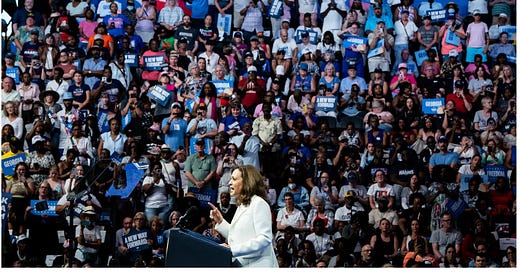


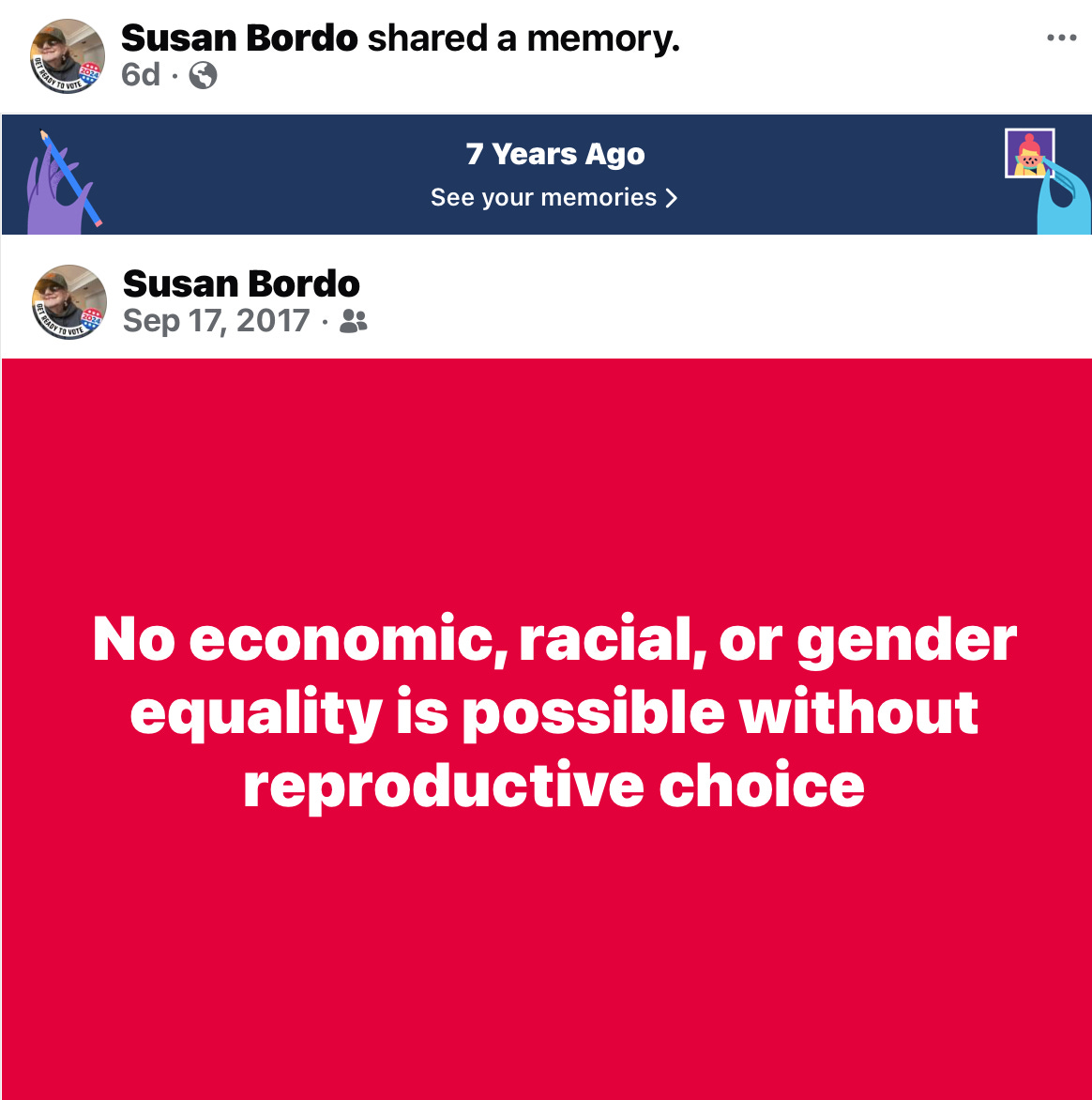
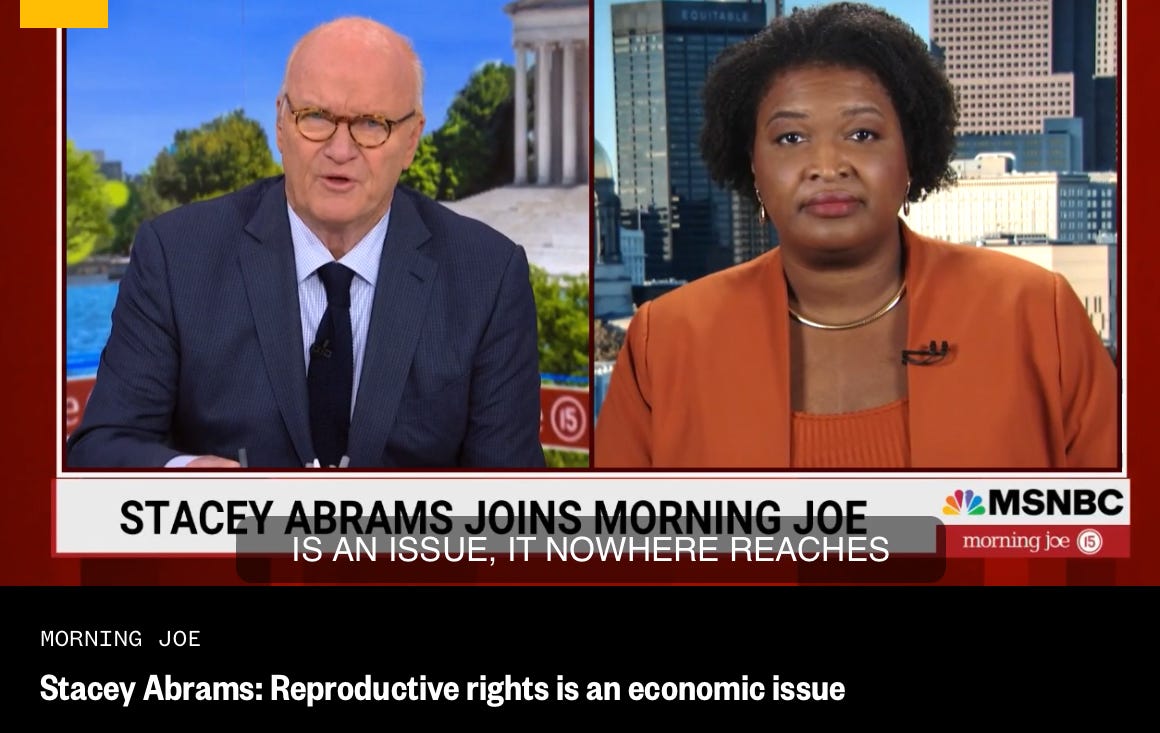

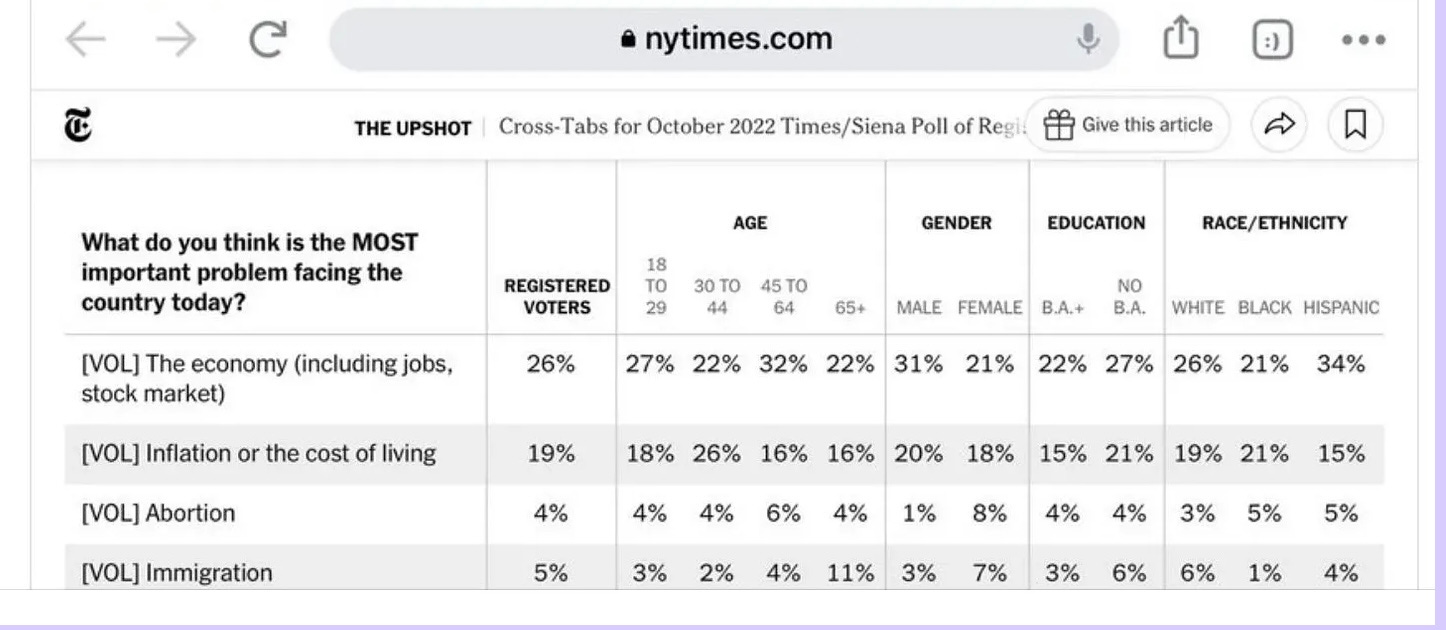
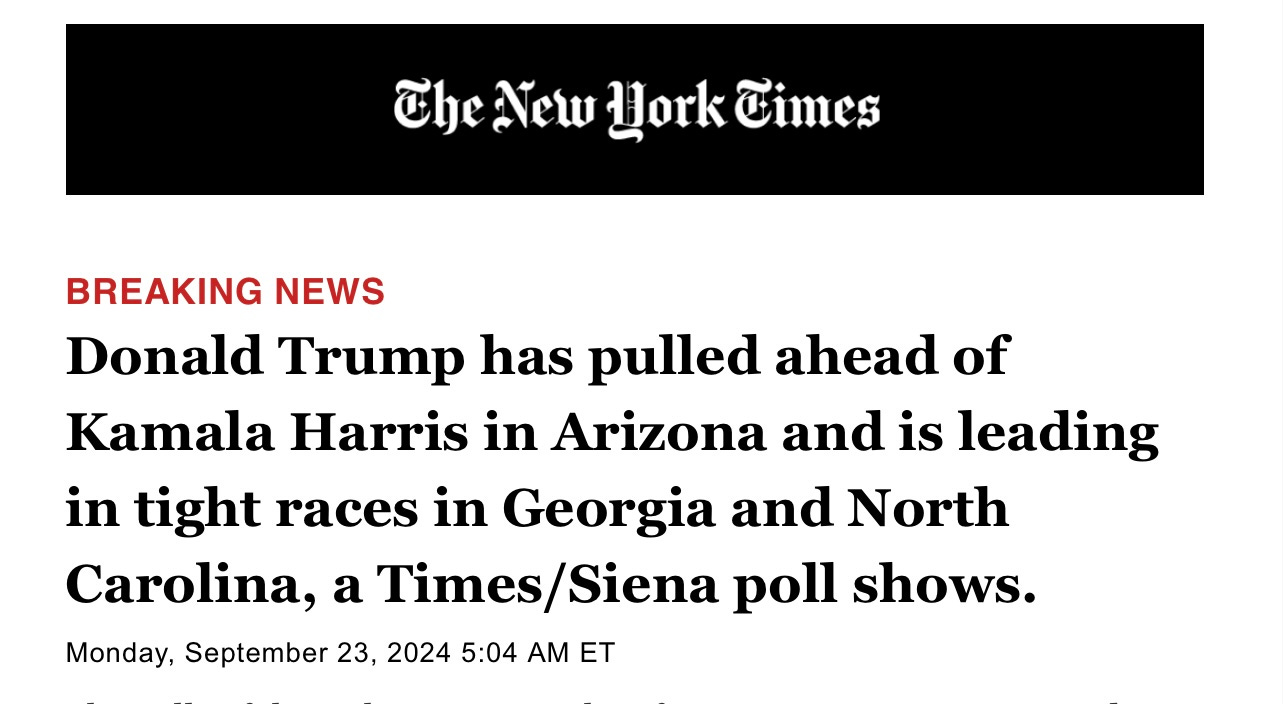
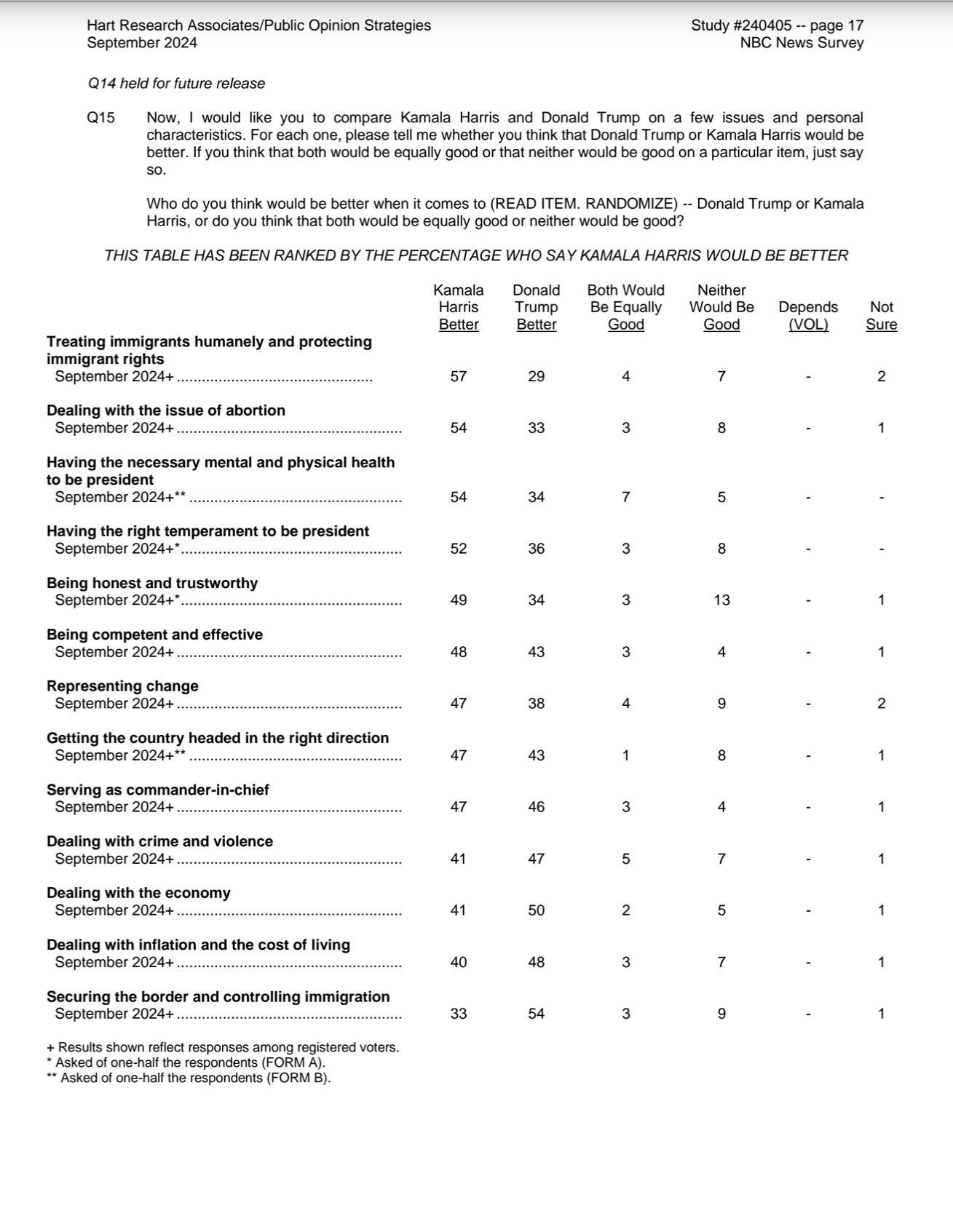
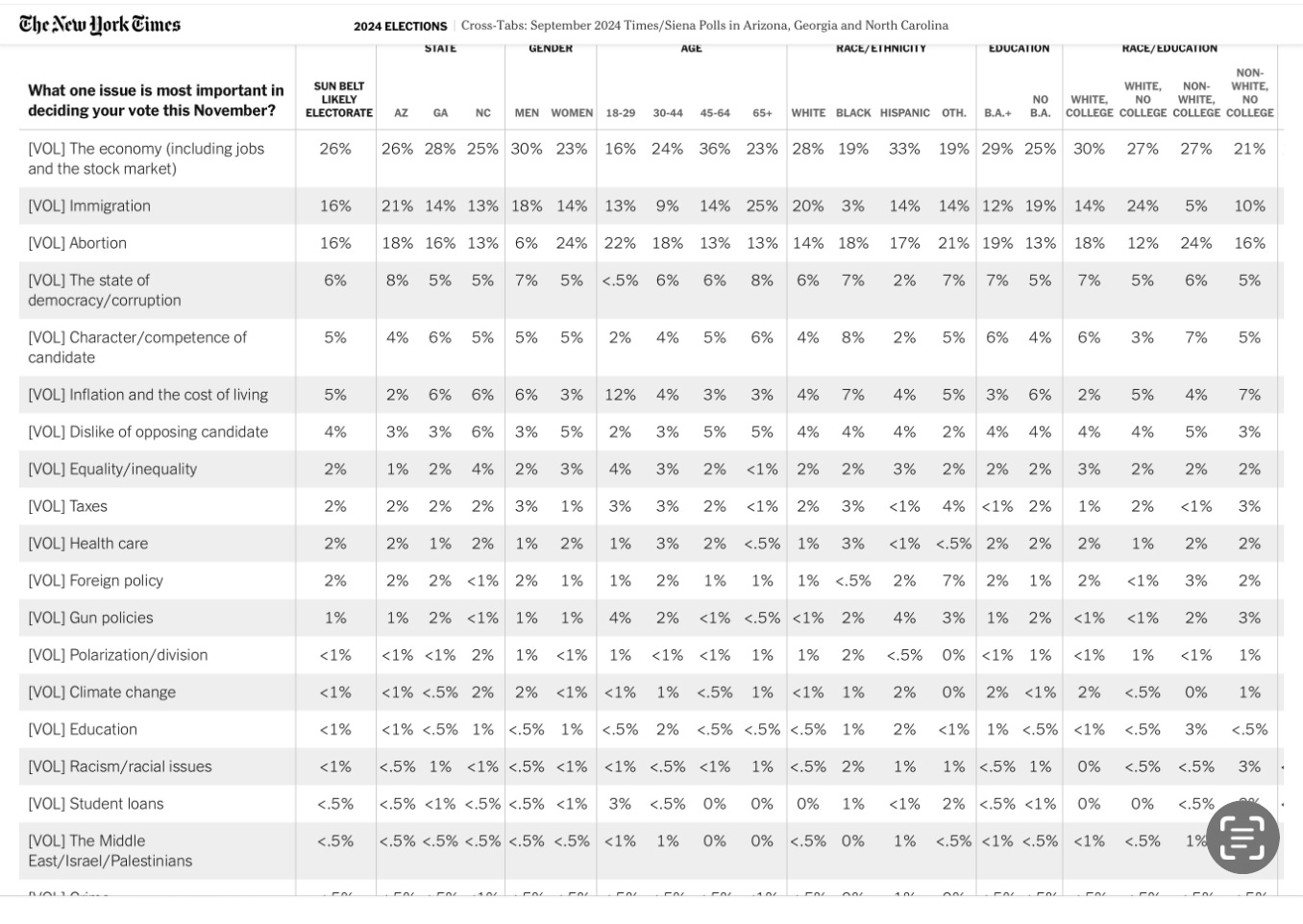
Have you seen the book Ejaculate Responsibly: A Whole New Way to Think About Abortion by Gabrielle Stanley Blair? Reframes responsibility for birth control brilliantly. (Seems complementary to this essay.)
This is one of the best articles on abortion and the economy issues that I have seen anywhere! Thanks, Prof. Bordo.